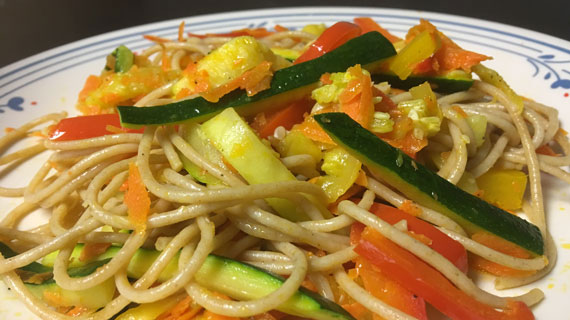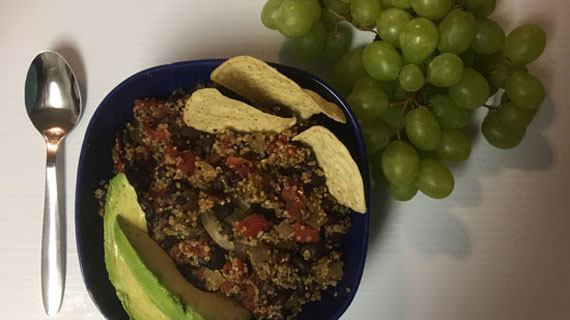Healthy Eating in a Dorm Room
Posted: January 13, 2022 | Author: Abbie Cochrane | Read Time: 6 minutes
 One of the most stressful things about college is coming up with a healthy grocery list on a college student budget. And it’s harder still to say no to that party size pack of Oreos that just happen to be on sale. While science shows that the “freshman 15” is an urban legend, it’s important to focus on your health in college. Luckily, eating healthy in your dorm room is not as difficult as you might think. Here are some things to implement into your diet to help you stay healthy and energized in school.
One of the most stressful things about college is coming up with a healthy grocery list on a college student budget. And it’s harder still to say no to that party size pack of Oreos that just happen to be on sale. While science shows that the “freshman 15” is an urban legend, it’s important to focus on your health in college. Luckily, eating healthy in your dorm room is not as difficult as you might think. Here are some things to implement into your diet to help you stay healthy and energized in school.
Healthy Eating in a Dorm Room
Choose Your Carbs Wisely
Bread is the best, everyone knows this. Fortunately, eating whole grains found in wheat bread is really good for you! Whole grains offer more fiber and Vitamin B, which boosts your energy throughout the day. Other options for whole grains include brown rice, oats, quinoa, whole-wheat pasta, and whole wheat crackers.
Pump Up the Protein
Fun fact! Did you know that protein is found in plants just as much as it’s found in animal products? Protein helps you stay strong and repairs your muscles and tissues when you get hurt or tired. The best animal proteins include fish and seafood, white-meat poultry (i.e. chicken breast or wings), lean cuts of beef and pork (sirloin, tenderloin, eye of the round), eggs, as well as skim or low-fat milk, cheese, or yogurt. If you would rather opt for plant-based protein, try tofu, beans, chia seeds, peanut butter, avocado, apricot, blackberries, potatoes, spinach, and so much more!
Find Healthy Fats
The tricky thing with fats is determining whether or not they are mono/polyunsaturated fats or if they are trans fats, which are man-made. What about saturated fats? Those fall in between the two. Good examples of unsaturated include vegetable oils like olive, canola, soy, and sunflower, as well as nuts, seeds, and fish. Saturated fats can be found in red meat, butter, and cheese. While saturated fats aren’t as harmful as lots of trans fats, it’s best to eat saturated fats in moderation. Trans fats can be found in most junk foods, so it’s best to keep those for occasional consumption.
Don’t Consume Too Much Dairy
You need the calcium found in dairy products, as well as other key nutrients like potassium and Vitamin D, to help maintain strong bones and bone growth. If you get your calcium from dairy products, choose skim or low-fat options. If you want to get those nutrients from a different source, try plant-based milk (soy, almond, cashew, etc.), leafy greens, canned fish, or sesame butter. But for those who do consume dairy products, portioning is important because your body doesn’t need too much.
Those are the basics of the sorts of food your body needs, but it’s important to remember that nutrition is different for everyone. Each body is unique and needs different diets, nutrients, and portion sizes. Some people may need to substitute certain foods because of an allergy, intolerance, or a vegan/ vegetarian preference, but there are so many healthy options for you to choose from!
Meal Planning and Grocery Shopping as a College Student
If you’re going to be cooking for yourself, you may be curious about how to start meal planning and grocery shopping.
Have A Plan
Think about what you want to eat that week and the ingredients you need to prepare each meal. It’s best to keep a written plan on paper or on your phone so you don’t forget anything. Try keeping a list at home and add to it whenever you run out of something you need that you buy often. Do a weekly inventory of your fridge, freezer, and pantry so you know what to buy next time you go to the store.
Budget
Try to stick as close to your list as possible and don’t go overboard buying things that you can go without which will end up costing you more. If you can, shop at stores that offer bulk deals like Walmart, Costco, Trader Joe's, etc. That way, you can get more of what you need for a lower price. Just remember, you have limited room in your fridge, so don’t buy loads of something that won’t fit in the space you have. Another tip is to buy as many items as you can that have a long shelf life, meaning that they don’t expire quickly (pasta, canned goods, etc.). This way, you don’t have to buy the product over and over. Most essential food items like sugar, flour, oil, etc. are available in bulk, so consider that the next time you head to the supermarket.
Also, the store’s brand will most likely be cheaper than other brands. But don’t worry--they taste exactly the same. So, don’t buy a large container of something if you only intend on using a tiny amount of it for a recipe. If you don’t know what to do with the leftovers, opt for the smaller container.
Don’t Go to the Store When You’re Hungry
This speaks for itself; don’t go shopping on an empty stomach because you are more likely to stock up on junk food and things you don’t need because your rumbling stomach told you to. A great life hack for this is to shop online and do curbside pickup so you don’t have to go in the store and look at all the food.
Shop With the Seasons
Everyone knows that fruits and veggies have their special seasons. Whenever a produce item is in its prime season, chances are that the price will be lower and the quality will be better. Not only will this add color and variety to your diet, but your wallet will thank you later.
Limit Purchase of Pre Made Meals
Pizza rolls and chicken nuggets may be the way to the heart of most college students, however, it’s not the most heart-healthy option. Instead of spending money on microwavable mac and cheese, try to direct your funds to foods that are better for you. Mac and cheese is fine to have when you’re in a rush, but it’s a better idea to try and take the time to prepare a healthier option when you can.
If you get nervous about planning meals on your own, no worries! Check out the dining services on campus to see what options you have. You can always opt for dining hall services provided by the school.
At Southern Utah University, students also have access to the HOPE Pantry, which provides nonperishable food items to students who may require a little financial assistance when it comes to buying food. While the pantry is open to everyone, regardless of financial circumstance, the pantry asks that students be considerate of everyone who chooses this option.
Now you’re on your way to being a smarter, more food-savvy student. Get out there and choose healthy!
This article was published more than 3 years ago and might contain outdated information or broken links. As a result, its accuracy cannot be guaranteed.
Tags: Student Life



